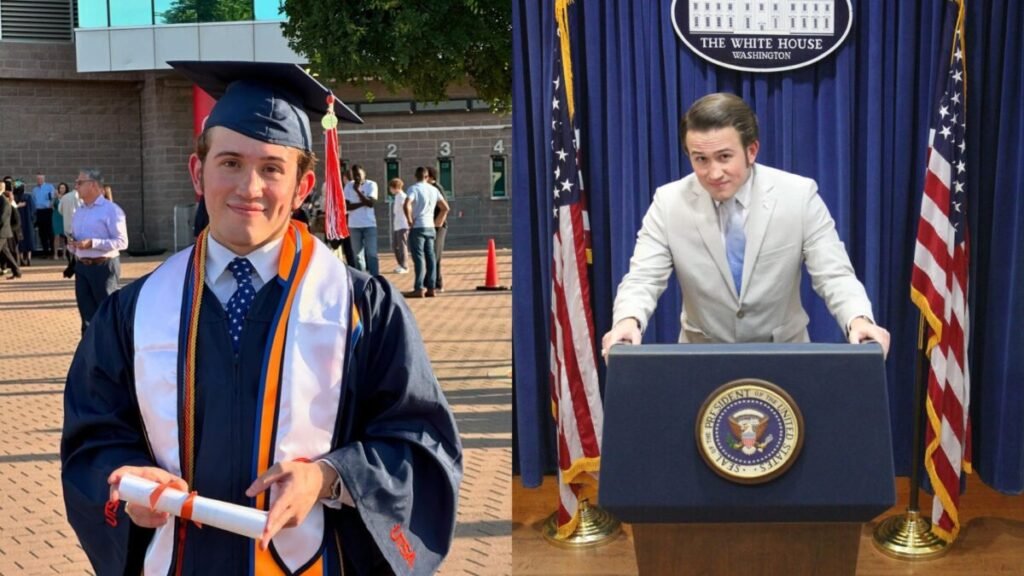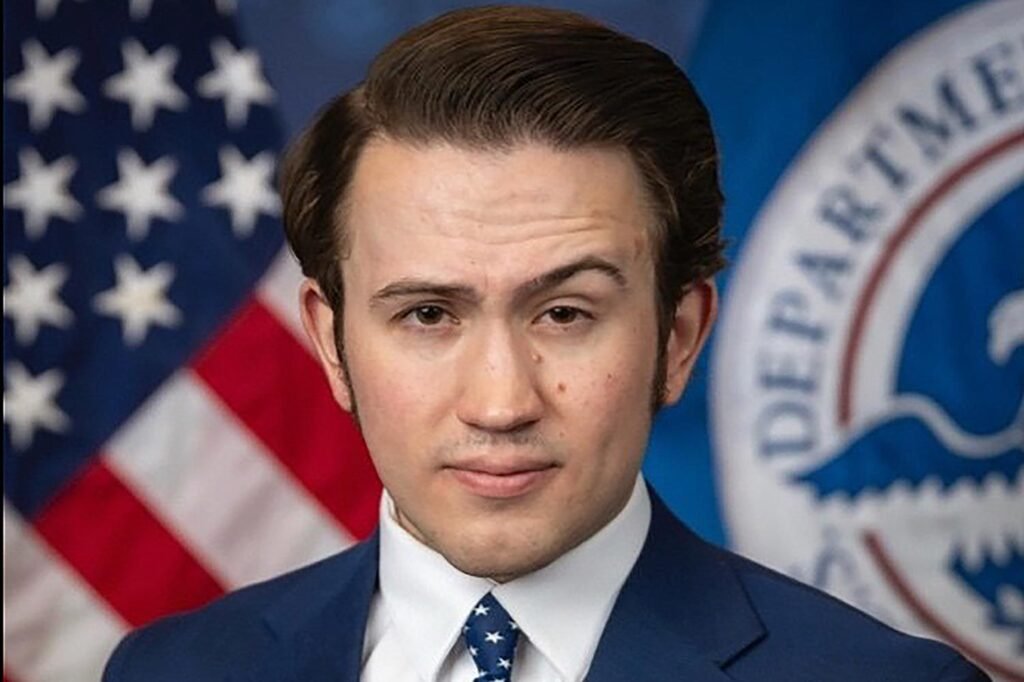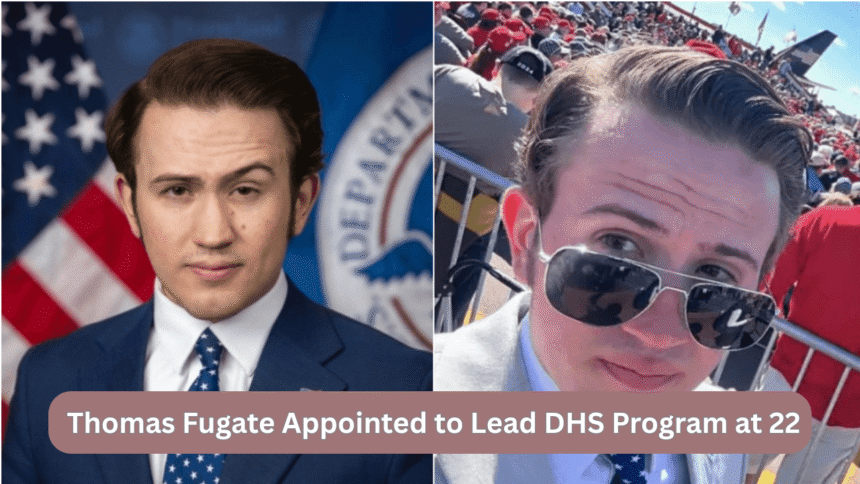President Donald Trump has appointed 22-year-old Thomas Fugate to lead the Department of Homeland Security’s Center for Prevention Programs and Partnerships (CP3). The move has generated widespread concern across the political spectrum. Fugate, a recent graduate of the University of Texas at San Antonio, has little professional experience in national security or public administration.
While supporters hail Fugate as a fresh voice with potential, critics argue the decision is a clear example of political favoritism. The role he now holds is meant to help prevent domestic terrorism and targeted violence. With tensions already high over national security issues, the appointment has only added fuel to the fire.
Thomas Fugate’s Background Raises Eyebrows
Before this high-level appointment, Thomas Fugate worked briefly as a gardener and a grocery store assistant. His only prior political involvement was as an intern at the Heritage Foundation and a legislative aide in Texas. Those defending his appointment claim that his dedication to conservative principles and education make him fit for leadership.
However, many government insiders remain skeptical. CP3 is tasked with coordinating anti-terror strategies, partnering with communities, and funding preventive measures nationwide. A role this significant, many argue, should be filled by someone with deep expertise and experience in counterterrorism or policy enforcement.
Political Loyalty vs. Professional Qualifications
Analysts suggest that Fugate’s loyalty to Trump’s MAGA agenda played a bigger role than his qualifications. The former president has long been known to place allies in key roles, even when they lack technical experience. Fugate’s name surfaced on conservative youth platforms and think tanks aligned with Trump’s ideology.

Thomas Fugate, during a short public statement, thanked the administration for its confidence in his abilities. He promised to “bring youthful energy and dedication to national safety efforts.” Yet, the broader public conversation is far from settled.
Opponents claim this move could undermine public trust in the Department of Homeland Security. They believe experienced professionals should lead efforts to combat extremism and prevent violence. Elevating someone so young, they argue, sends a dangerous message about the value of competence in national security.
Reactions from Experts and the Public
Security analysts were quick to express concern. “Experience matters in a role like this,” said one retired intelligence official. “This isn’t a student council position—it involves national lives and safety.”
Meanwhile, several public safety organizations have called for congressional oversight. Some are demanding a formal review of the appointment process, citing national risk. Civil rights advocates are also watching closely, fearing the potential for overreach or ineffective strategy under untested leadership.
Social media has exploded with commentary. Supporters of the MAGA movement have rallied behind Fugate, using hashtags to cheer his appointment. However, the backlash has been equally loud, with thousands questioning the merit behind the selection.
A Generational Shift or a Political Play?
Some argue that appointing younger leaders reflects a broader shift in governance. They believe it could signal a move toward innovation and fresh perspectives. But that optimism is not shared by everyone, especially when public safety is at stake.
The DHS’s CP3 program was established to partner with schools, local law enforcement, and mental health professionals. It requires delicate judgment, crisis management skills, and coordination at a federal level. Critics doubt that Thomas Fugate, despite his academic credentials, has the capacity to manage such complexity.
In contrast, Trump allies claim this is precisely the change Washington needs. They argue that younger leaders like Fugate are not “bogged down by bureaucracy” and can help reform bloated systems.
Thomas Fugate Faces an Uphill Battle

As the criticism mounts, Fugate’s future in the role is uncertain. Congressional Democrats have already begun drafting letters of concern to DHS officials. Even some Republican lawmakers have privately questioned the decision. Whether or not Fugate will be confirmed in the long term may depend on his ability to perform under immense scrutiny.
Thomas Fugate’s presence in this role might set a precedent for future political appointments. His actions, decisions, and leadership will be monitored closely by media and security agencies alike. If he succeeds, he may prove doubters wrong and carve a name for himself as a young reformer. If not, his appointment may be remembered as a cautionary tale of misplaced trust.
The National Stakes Could Not Be Higher
At a time when domestic terrorism continues to rise, the stakes for CP3 and DHS are high. Communities rely on these programs for guidance, funding, and emergency response strategies. Any mismanagement could have real-world consequences.
Supporters argue that judging Fugate solely on age is unfair. They ask that he be given time to prove his worth. But in a post-9/11 landscape, where every decision is magnified, many believe there is no room for learning curves.
For now, Thomas Fugate has taken the seat. Whether he can hold it—and earn the nation’s trust—remains to be seen.
Final Word on the Appointment
This appointment is more than just a political headline. It’s a test of how America views leadership, qualification, and public safety. While Thomas Fugate may grow into his role, his current appointment is a gamble with real implications.
The coming months will determine whether Trump’s decision was visionary or reckless. Either way, this story is far from over—and so is the conversation surrounding it.
For more details on recent national security decisions, you can read about Trump bans travel from 12 countries and its impact on immigration policies.

